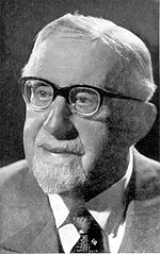
Erich von Tschermak
Encyclopedia
Erich von Tschermak-Seysenegg (15 November 1871 – 11 October 1962) was an Austria
n agronomist
who developed several new disease-resistant crops
, including wheat-rye and oat hybrids. He was a son of the Moravia-born mineralogist
Gustav Tschermak von Seysenegg
. His maternal grandfather was the famous botanist, Eduard Fenzl
, who taught Gregor Mendel
botany
during his student days in Vienna
.
He received his doctorate from the University of Halle
, Germany
, in 1896. Tschermak accepted a teaching position in Vienna at the University of Agricultural Sciences in 1901, and became professor there five years later, in 1906. Von Tschermak is one of three men—see also Hugo de Vries
and Carl Correns
—who independently rediscovered Gregor Mendel's work on genetics
. Von Tschermak published his findings in June, 1900.
Austria
Austria , officially the Republic of Austria , is a landlocked country of roughly 8.4 million people in Central Europe. It is bordered by the Czech Republic and Germany to the north, Slovakia and Hungary to the east, Slovenia and Italy to the south, and Switzerland and Liechtenstein to the...
n agronomist
Agronomist
An agronomist is a scientist who specializes in agronomy, which is the science of utilizing plants for food, fuel, feed, and fiber. An agronomist is an expert in agricultural and allied sciences, with the exception veterinary sciences.Agronomists deal with interactions between plants, soils, and...
who developed several new disease-resistant crops
Disease resistance in fruit and vegetables
There are a number of lines of defence against pests and diseases in the organic garden, principal among these being the practice of good husbandry, creating healthy soil and ensuring high standards of garden hygiene...
, including wheat-rye and oat hybrids. He was a son of the Moravia-born mineralogist
Mineralogy
Mineralogy is the study of chemistry, crystal structure, and physical properties of minerals. Specific studies within mineralogy include the processes of mineral origin and formation, classification of minerals, their geographical distribution, as well as their utilization.-History:Early writing...
Gustav Tschermak von Seysenegg
Gustav Tschermak von Seysenegg
Gustav Tschermak von Seysenegg was an Austrian mineralogist.-Biography:He was born 19 April 1836 in Littau, Olomouc District, Moravia and studied at the University of Vienna where he obtained a teaching degree. He studied mineralogy at Heidelberg and Tübingen and obtained a PhD...
. His maternal grandfather was the famous botanist, Eduard Fenzl
Eduard Fenzl
Eduard Fenzl was an Austrian botanist.An obituary notes "[h]e was Professor of Botany and Director of the Imperial Botanical Cabinet, a member of the Vienna Academy of Sciences, and Vice-President of the Vienna Horticultural Society."...
, who taught Gregor Mendel
Gregor Mendel
Gregor Johann Mendel was an Austrian scientist and Augustinian friar who gained posthumous fame as the founder of the new science of genetics. Mendel demonstrated that the inheritance of certain traits in pea plants follows particular patterns, now referred to as the laws of Mendelian inheritance...
botany
Botany
Botany, plant science, or plant biology is a branch of biology that involves the scientific study of plant life. Traditionally, botany also included the study of fungi, algae and viruses...
during his student days in Vienna
Vienna
Vienna is the capital and largest city of the Republic of Austria and one of the nine states of Austria. Vienna is Austria's primary city, with a population of about 1.723 million , and is by far the largest city in Austria, as well as its cultural, economic, and political centre...
.
He received his doctorate from the University of Halle
University of Halle-Wittenberg
The Martin Luther University of Halle-Wittenberg , also referred to as MLU, is a public, research-oriented university in the cities of Halle and Wittenberg within Saxony-Anhalt, Germany...
, Germany
Germany
Germany , officially the Federal Republic of Germany , is a federal parliamentary republic in Europe. The country consists of 16 states while the capital and largest city is Berlin. Germany covers an area of 357,021 km2 and has a largely temperate seasonal climate...
, in 1896. Tschermak accepted a teaching position in Vienna at the University of Agricultural Sciences in 1901, and became professor there five years later, in 1906. Von Tschermak is one of three men—see also Hugo de Vries
Hugo de Vries
Hugo Marie de Vries ForMemRS was a Dutch botanist and one of the first geneticists. He is known chiefly for suggesting the concept of genes, rediscovering the laws of heredity in the 1890s while unaware of Gregor Mendel's work, for introducing the term "mutation", and for developing a mutation...
and Carl Correns
Carl Correns
Carl Erich Correns was a German botanist and geneticist, who is notable primarily for his independent discovery of the principles of heredity, and for his rediscovery of Gregor Mendel's earlier paper on that subject, which he achieved simultaneously but independently of the botanists Erich...
—who independently rediscovered Gregor Mendel's work on genetics
Genetics
Genetics , a discipline of biology, is the science of genes, heredity, and variation in living organisms....
. Von Tschermak published his findings in June, 1900.

